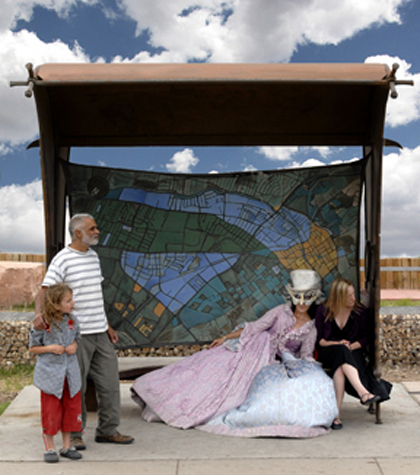 She could be happier if she lived in a more equitable society.What’s the “last great British taboo”? Sex? Religion? Lavatorial practices? Nope, it’s what we earn, according to Times Editor Daniel Finkelstein, in his recent BBC Radio show “Can Pay, Will Pay.”
She could be happier if she lived in a more equitable society.What’s the “last great British taboo”? Sex? Religion? Lavatorial practices? Nope, it’s what we earn, according to Times Editor Daniel Finkelstein, in his recent BBC Radio show “Can Pay, Will Pay.”
Finkelstein’s exploration of our growing income inequalities, and the effect they have on us, made for fascinating listening. Discrimination of all sorts clearly still operates in the world of employment. Some of it is apparently intractable: Being tall gets you about an extra £1,000 [$1,580] a year per inch, and being ugly takes it away again. Other inequalities could be managed better. Bus drivers earn half as much as train drivers, perhaps for no better reason than a difference in training period of a few months and the effects of the market. Chefs are some of the most badly paid people in the country, and somehow, marketers amongst the best. According to the Office for National Statistics, in 2009, income of the top fifth of households in the U.K. was around 15 times greater than that for the bottom fifth.
It’s all very unfair, but does it actually matter? Should we be like Mandelson, intensely relaxed about some people getting obscenely rich? Does the fact that these gaps are widening make a difference to our chance of achieving sustainability?
Last year, British epidemiologists Richard Wilkinson and Kate Pickett published The Spirit Level, a remarkable study of the relationship between income inequality and a wide range of social ills in rich countries. Struck by data showing that once gross income reaches a certain level, increasing it has no benefit to wellbeing, they mapped the effect of widening income disparities within countries on everything from teenage pregnancy to childhood mortality to obesity. In most cases the correlation is not just striking, it is eerily precise.
If you want to see for yourself, visit equalitytrust.org.uk, where you can see some of the data and hear from the authors. Last week, I was lucky enough to hear Richard Wilkinson talk about how the work has progressed since the book was published. The data has got even stronger, and stunningly, the analysis has been repeated for U.S. states, showing how those with the highest income inequalities perform worse. There is also a correlation between equality and positive environmental behaviors, with those in more equal countries more likely to recycle.
Wilkinson also talked wearily of how the findings have been under attack from what he termed “the right” — commentators in various think tanks and media ideologically opposed to what he is saying and wanting to challenge his evidence. What’s interesting about this backlash is not so much the claims themselves — which Wilkinson and Pickett answer comprehensively on their site — but what underlies them. Clearly, as with climate change, it is very hard for some people to accept scientific evidence that does not fit with their way of seeing the world. The idea that making the rich richer causes more harm than good is politically inconvenient in the same way that the idea of the Earth going round the sun once was.
This is a particular challenge for Britain’s coalition government — and indeed all governments in rich countries who think the great prize is economic growth, and its effects on equality generally a secondary consideration. Though in the run-up to the election, David Cameron and others seemed to acknowledge the importance of fairness and equality, Broken Britain seems set to stay broken by the way the deficit is to be dealt with. The cost of bailing out the banks will fall disproportionately on those already disadvantaged, with the Institute for Fiscal Studies claiming the effect of cuts to public services on poorer households has not been factored in to the government’s analysis.
As Kate Pickett pointed out recently, if Cameron’s idea of a “Big Society” is going to mean anything, it will depend on us seeing our relationships with each other as at least as important as the pursuit of wealth. Perhaps that’s why we Brits find talking about money so embarrassing — we know deep down that discovering differences in this key driver of self-esteem will do more harm than good. Sustainable development also depends on high stocks of social capital — connection, reciprocity, trust, and the institutions that embody them. In short, high and growing inequality will not deliver sustainability.
This is a very challenging truth at a time of cuts and crisis in public services. A growing number of commentators (including the Financial Times‘ Martin Wolf) are saying that the scale of cuts planned in the government’s Comprehensive Spending Review (to be announced on Oct. 20) will damage the chance of economic recovery. If they also make inequality worse, their effect may be to diminish still further our inclination to save the planet. Though the government and the Labor Party under Ed Miliband both make noises about “fairness,” our chances of creating a Big Society or fixing Broken Britain in a rapidly deteriorating environment are practically nil. Maybe that’s another taboo, but it’s something we have to start talking about.




